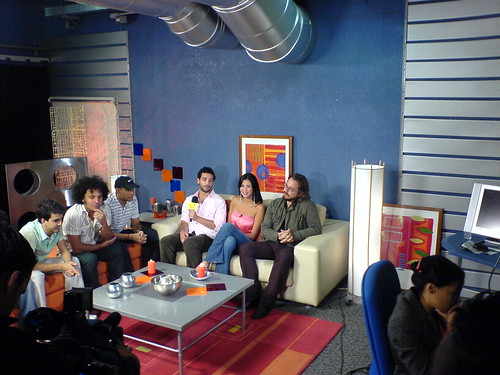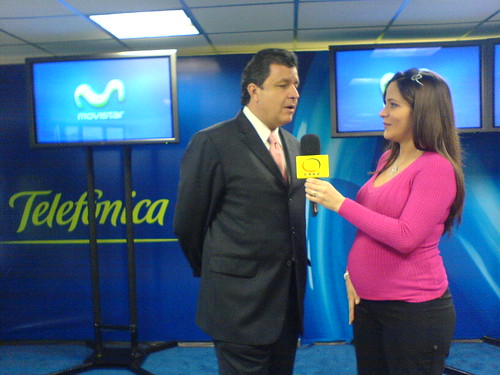Los Amigos Invisibles con Patricia [at RCTV] by Alfredo Izaguirre F.
Hugo Chavez, shortly after his re-election in December for a term of 6 more years of governance, announced that the license of a television channel, whose editorial line tends toward opposition, will not be renewed. Channel RCTV, with 52 years of operation, will have its transmission limited and it will no longer be able to broadcast over public spectrum, which puts its sustainability at risk. For that reason before the expression “closure of channel” and “no renovation of licensing” is a difference in what can be considered legitimate state procedure.
In the Venezuelan blogosphere, reflecting the current political division, opinions are split on one side or the other. Within the Venezuelan context, political debate circles around the emotional sensibility of each faction, which is why the arguments of both sides seem to be subject to the same reflections made by politicians.
On the one hand, the reasons of the Government to not renew the broadcasting license are based on the participation of the television station in the attempted coup d'etat of 2002 and oil sabotage of that same year. Also, the channel has maintained a critical and propagandistic editorial line against the government of Hugo Chavez. The president alleges that some constitutional laws and media-based legislation have been violated, although, up until now, no cases have been filed.
Those defending the channel – which, in the midst of such political polarization, become defenders of the anti-Chavez opposition – base their arguments on the media's right to freedom of expression, the labor rights of its workers, and the political plurality that must exist within a democracy.
Venezuelan bloggers like Kira Kariakin [ES] and Héctor Torres [ES] say that Chavez's decision marks the arrival of new times in which the Government presents its firmest policies to install a socialist system. In a post titled “Te jodo porque puedo” (I'll [screw] you because I can), Kira does not foresee a good result from the proposal: “
Estoy convencida de que este intento de socialismo no tendrá éxito. Y es porque aún con votos, el sistema que se persigue implantar es centralista, totalitario en el ejercicio de los poderes y ya está dando evidencias de querer controlar todos los niveles de la vida nacional en una estructura de dominio piramidal que inducirá la sensación de participación democrática aunque bajo la vigilancia y lineamientos de Chávez que estará sentado en su ápice.
On the other hand, NBV argues [ES] that, although the channel produces poor news and entertainment, the case should pass through the courts before the station is closed by presidential decree:
Es que yo podría estar de acuerdo, incluso, en que le quiten la concesión si es que les parece que han actuado ilegalmente. Pero primero deberían demostrar en un tribunal, ante un juez y un jurado, que hubo una conducta delictiva. No pueden retirarle la concesión nada más porque sí. Y definitivamente no debiera determinarlo una autoridad meramente administrativa, sino una judicial.
This way, the decision to watch the channel or not would be up to the viewer.
RCTV Interview by “Huguito”
Martha Beatriz [ES], a Venezuelan in Miami, considers it blackmail that the owners of the channel present arguments such as their “long contribution to national culture.” Nevertheless, in political terms, she argues that “a broadcasting license should not be a weapon in the hands of the politicians to punish.” She also examines the effects of a lack of political plurality: “The truth is that these measures are not only lessons for those affected, but also serious scares for everyone else. I wonder what type of “revolutionary” mentalities are forming in these times.”
The strategy of channel RCTV to appeal to historical memory and cultural roots of Venezuela's population, is analyzed by the journalist-blogger Jose Roberto Duque, who warns of “emotional blackmail” that tries to hide the bad quality of its programming and the protection of an economic class accustomed to the argument worker's rights to employment. He writes, “the RCTV of today is a monument to decay; not only moral, but artistic.”
Besides wondering why the government has not taken similar actions with other opposition television channels, Rom Rod asks [ES] if, with this measure, the government,
¿se quiere intimidar a RCTV? ¿O de verdad el grupo 1BC son una partida de sediciosos que a punta de malos programas quieren desinformar a la gente y tumbar el gobierno? ¿O es que la gente es tan estúpida en este país como para hacerles caso y creerse todo lo que ellos le quieren decir a la gente? Si hay casos concretos de manipulación de la información y de intentos de sedición pues procedan legalmente.
The broadcasting license of RCTV does not expire until May 27. It remains to be discussed under what procedure they will cease transmission, but like Luigino Bracci points out [ES], the Minister of Communication and Information, Willian Lara is planning a new audiovisual production for the new channel to debut around that date. The discussions continue …
Translated from Spanish by David Sasaki.









7 comments
i agree that the process should pass judicial muster…but what will chavez do if the courts decide against him? should he ban the courts? it’s a risk…what do you think? adios
1) First of all, the license is not being revoked. It is biased and misleading to state it as so. The 20-year license is up for renewal. Taking this into consideration, why in hell would anyone enable this FOX NEWS of the south to brainwash the public if the opportunity to passively dismiss the coup-assistants. I’ve been stuck in Caracas hotels with RCTV blasting, trust me…it ain’t pretty.
2) Did somebody say PLURALITY! HAHAHA! Oh man, you must not have ever seen Venezuelan media. There is Channel Vive and Channel 8 (state tv)…and then every other media outlet is blasting right-wing propaganda like nothing you’ve ever seen! Plurality! Jeeze, the U.S. needs some freakin’ PLURALITY!
3) Reports without boarders is backing the bosses of RCTV right now. Why? Reporteurs sans Frontieres is funded by the National Endowment for Democracy, a CIA front, an entity created by Ronald Reagan with congressional funds and the objective of promoting US foreign policy worldwide.
4)In the U.S. if a newspaper or TV station assisted a coup against George Bush they would not lose their license. It would be bombed to the ground like Al-jazeera and the involved citizens put in a gas chamber for treason.
Seriously, get real…